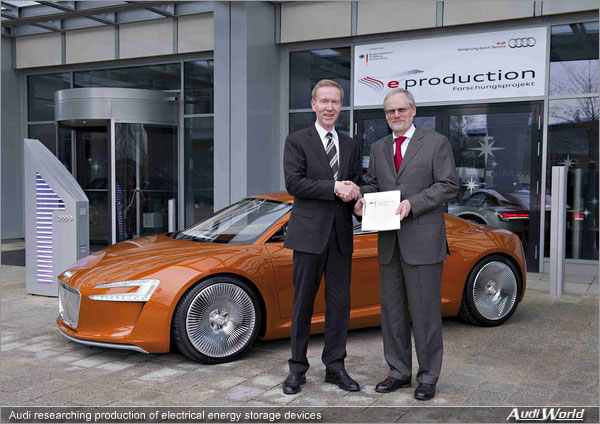Audi researching production of electrical energy storage devices
Ingolstadt, December 13, 2011 – Audi is continuing to step up its activities in the field of electric mobility. Today the car manufacturer is launching the eProduction research project together with selected partners. Its goal is to generate expertise in the assembly of traction batteries and develop a production concept for the energy storage devices of electric cars. The three-year project is being sponsored by the German Federal Ministry of Education and Research (BMBF). “With eProduction we are taking the next important step on the road to electric mobility,” says Frank Dreves, Member of the Board of Management for Production at AUDI AG. This research project will give Audi the expertise to produce the battery systems and some of their peripheral components itself. “This will put us in a position to produce electrically powered cars in larger numbers – in a way that is efficient, safe, robust and sustainable,” explains Dreves.
A traction battery is a highly complex system. As far as its performance and lifetime are concerned, the arrangement of the cells plays a similarly important role as the cooling system, which can use either air or coolant. Components such as the high-voltage and service connections, the electronic management system, the electromechanical components, the housing and various sensors and actuators round out the battery system.
Through the eProduction research project, Audi is looking to build up the necessary process and automation infrastructure – with the goal of developing a marketable production concept for high-voltage energy storage devices in battery electric vehicles (BEVs). The future process chain starts with the materials used, considers matters of lightweight construction and the depth of value added, includes new contacting and joining techniques and ends with test methods suitable for volume production.
Audi has acquired two companies as its project partners – the software experts from Dassault Systèmes and the engineering specialists from Fees Verzahnungstechnik. Seven universities and institutes are also involved: Dresden University of Technology (TU Dresden), Chemnitz University of Technology (TU Chemnitz), Munich University of Technology (TU München), the Friedrich-Alexander University of Erlangen, the Rheinische Fachhochschule (University of Applied Sciences) in Cologne, the RWTH Aachen and the Fraunhofer Institute for Manufacturing Technology and Advanced Materials in Bremen.
One focus of the research project is the safety of employees during the production of high-voltage components. This includes numerous aspects – from the training of staff and the automation of certain work steps to the virtual validation process, which involves simulating and analyzing the later production steps on the computer, also taking account of ergonomic factors. Another research focus concerns the question as to how existing norms and standards, on protective clothing for example, have to be evolved for the production of electrical components.
The expertise that the partners in the eProduction research project jointly provide could mean an innovation leap for industry in Germany as a whole. This should help the German government to reach its goal of putting one million electric vehicles on the road by 2020. It also has the potential to secure employment in Germany in the medium and long term.
Ministry Director Prof. Dr. Wolf-Dieter Lukas emphasizes the project’s contribution toward safeguarding Germany’s competitiveness: “The increasing level of electrification of the automobile has significant consequences for the production process. This applies particularly to battery production, which represents a large proportion of the value chain.” Lukas is pleased that a high-powered consortium has been formed under the leadership of AUDI AG as part of the “eProduction” project that intends to go new ways not just in terms of production but also with regard to providing the necessary training for the required specialist employees. “We at the BMBF are delighted to be supporting this project through our sponsorship.”
In its publication “Schlüsseltechnologien für die Elektromobilität (STROM)” (Key Technologies for Electric Mobility), the BMBF states its intention to sponsor the project as part of the high-tech strategy IKT 2020 with a total budget of 11.3 million euros.
|

